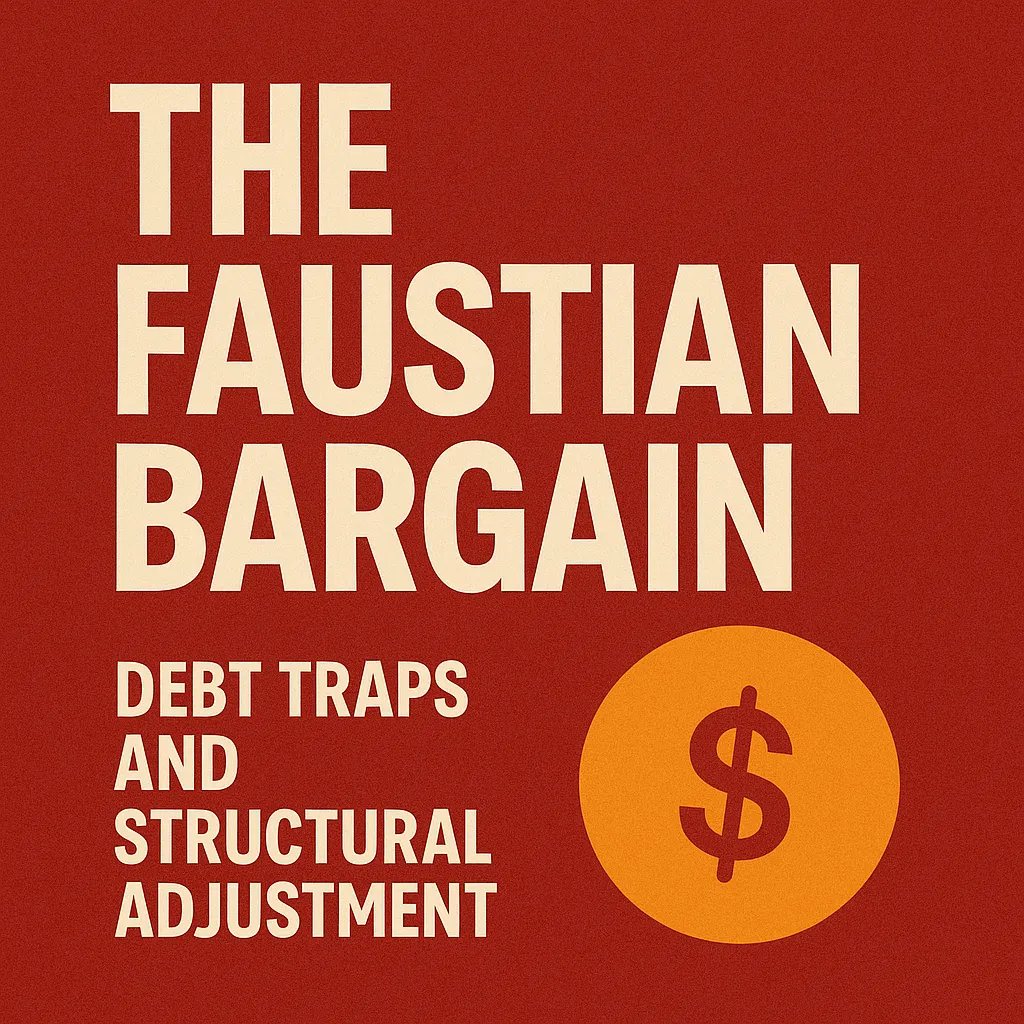
Part II: The Faustian Bargain – Debt Traps and Structural Adjustment
If the IMF were a character in a novel, it might be a well-dressed banker offering a lifeline to a drowning man – then charging him rent on the rope. At first glance, the Fund’s emergency loans appear benevolent. A struggling nation facing hyperinflation, currency collapse, or balance-of-payments crisis calls for help, and the IMF answers with a “rescue package.” But these packages come with fine print: structural adjustment programs, or SAPs, that radically reshape a nation’s economy, often with devastating consequences.
SAPs are a one-size-fits-all cocktail of fiscal austerity, privatization, and deregulation. Governments receiving IMF loans are typically required to cut public spending, lay off workers, slash subsidies for food and fuel, liberalize trade, devalue their currencies, and sell off state-owned enterprises – often to foreign buyers. The stated goal is to restore macroeconomic stability and investor confidence. The actual result, however, is frequently social unrest, political upheaval, and deeper poverty.
Take Ghana in the 1980s. Facing economic collapse, the country turned to the IMF. In exchange for loans, it had to accept SAPs that included massive devaluation, cutting government jobs, and opening markets to foreign imports. While inflation was tamed, the cost of living soared, unemployment rose, and local industries were decimated by cheap foreign goods. Similar stories abound across Latin America, Africa, and Southeast Asia. In dozens of cases, the pattern repeats: austerity kills demand, foreign firms buy up local assets at fire-sale prices, and inequality deepens.
The IMF has long argued that these reforms are necessary medicine – bitter but healing. But critics see them as economic colonialism. Countries lose control over their budgets and resources, making decisions to satisfy creditors rather than their own citizens. In Haiti, SAPs pushed by the IMF and World Bank forced the government to remove tariffs on imported rice in the 1990s – opening the floodgates to subsidized American rice and bankrupting local farmers. To this day, Haiti remains dependent on food imports.

Even mainstream economists have begun to acknowledge the damage. Nobel laureate Joseph Stiglitz, once chief economist at the World Bank, famously criticized the “market fundamentalism” behind these policies. He argued that the IMF’s interventions often worsened crises rather than solving them, creating what he called “IMF riots” – social unrest triggered by cuts to basic services. Far from promoting growth, SAPs often left nations poorer, angrier, and more beholden to international creditors.
And the kicker? Even after enduring the pain, many countries find themselves back at the IMF’s door years later, in worse shape than before. The cycle of debt continues, like a treadmill that goes nowhere – except perhaps deeper into the pocketbooks of the creditor class.
But what if there was an exit ramp off this treadmill? What if nations could opt out of this high-interest hamster wheel entirely? Enter Bitcoin: a decentralized, non-sovereign monetary network that doesn’t care about your GDP, voting rights, or colonial past. In Part III, we’ll explore how this open-source alternative offers a radically different vision of economic sovereignty.
Continue to Part 3 here: https://bullishbtc.com/post/part-iii-of-the-series-imf-vs-bitcoin-power-inequity-and-the-fight-for-financial-sovereignty
APA References
Ammous, S. (2018). The Bitcoin Standard: The Decentralized Alternative to Central Banking. Wiley.
Farrington, A., & Meyers, S. (2022). Bitcoin Is Venice: Essays on the Past and Future of Capitalism. Bitcoin Magazine Books.
Gladstein, A. (2022, July 6). How the IMF and World Bank repress poor countries. Bitcoin Magazine. https://bitcoinmagazine.com/culture/imf-world-bank-repress-poor-countries



